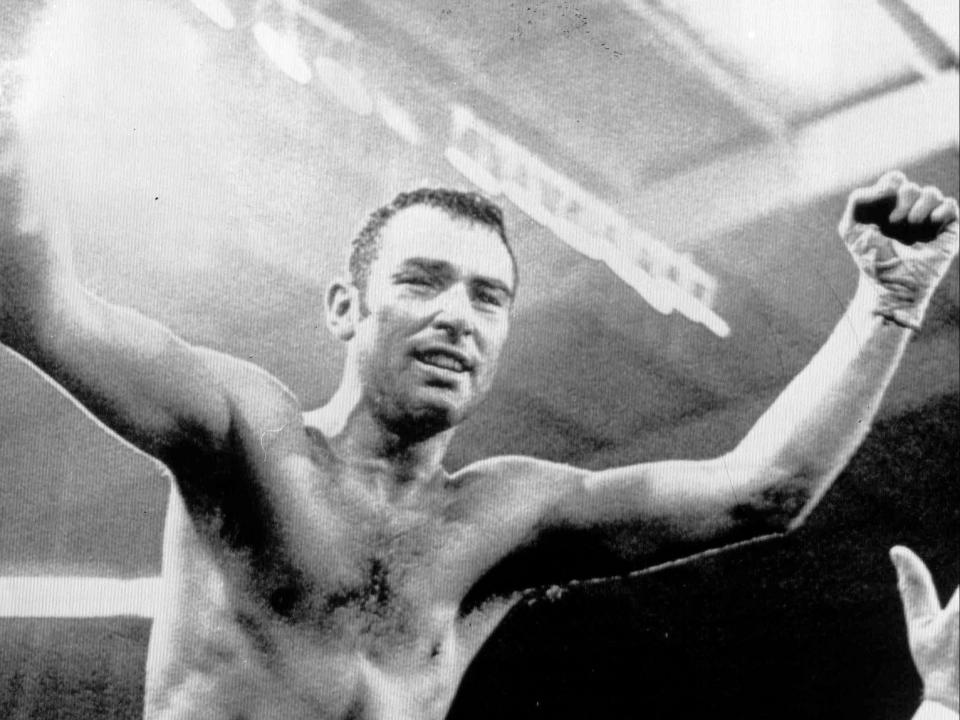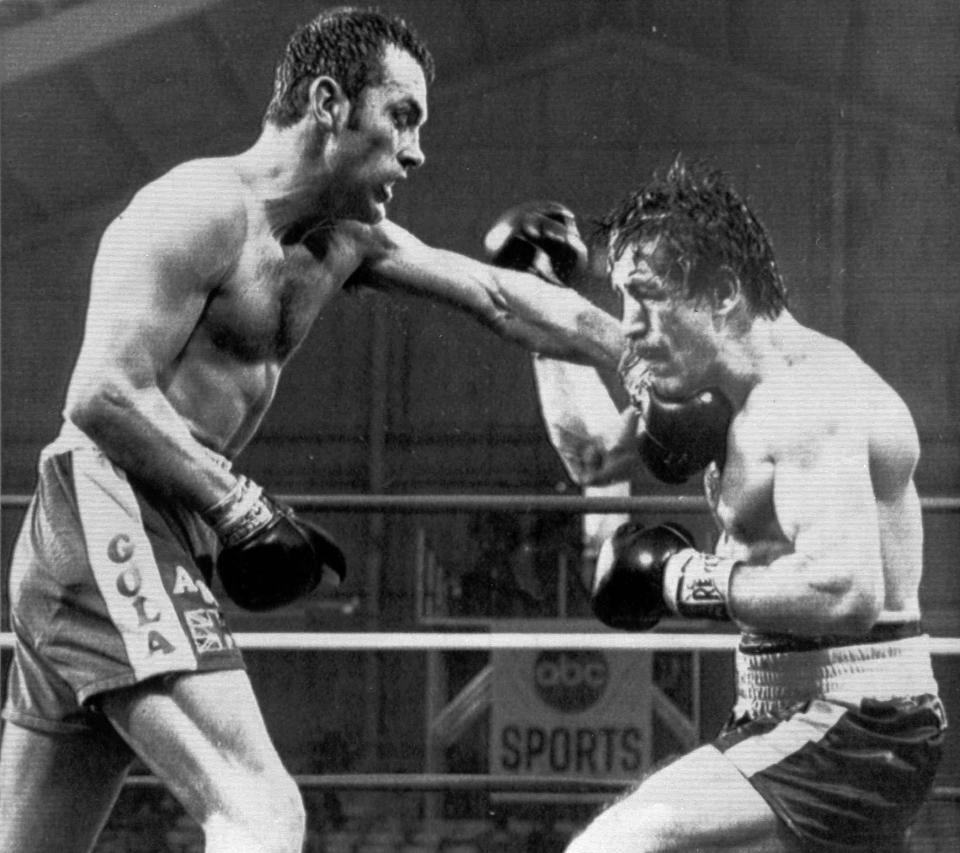Alan Minter leaves unforgettable legacy packed with blood, guts, racism, death and denial

There was blood, guts, racism, pride, danger, death, denial and some truly unforgettable nights in the boxing life and times of Alan Minter.
Minter won the unified world middleweight title one March day in Las Vegas in 1980 when he got a split decision over Vito Antuofermo in a truly bad-tempered and nasty brawl. In the next six months he would make one defence, then lose it in a fight with Marvin Hagler on a night of shame.
Eight years before Minter travelled to Las Vegas, he won a bronze medal at the Munich Olympics; he lost a controversial decision to a West German in the semi-final and that man won the gold. However, Minter was lucky to even be at the Olympics because his attempt to win the domestic amateur title that year had ended in blood when he was stopped on cuts by Frankie Lucas, who then won the national title.
Lucas was not selected, Minter was, but the pair had a fight over three rounds of three minutes on a club show at a cabaret venue in Croydon just weeks before the Olympics. Minter won the rematch, a night lost in time.
Just six weeks after losing at the Olympics, Minter turned professional in a boxing business that is now barely recognisable. In his first fourteen months the Munich idol - established very quickly as a ticket-selling machine - lost three of his sixteen fights. All the defeats had been because of cuts and his journey must be considered extraordinary even by the harsh standards of boxing in Britain in the Seventies.

In just a six-week period at the end of 1973 he lost back-to-back fights to a man called Jan Magdziarz and there is no way that his cuts could have healed. It was a ruthless business and the promoters needed their attractions to fill either the Royal Albert Hall or Wembley Arena every few weeks. The fights were on the BBC, Minter was popular and then he became a genuine superstar.
“It was a very different world back then,” Minter told me in 2009. “You had to fight for everything and even then you still might not get anywhere near a title.”
He fought three fifteen-round British middleweight title fights with Kevin Finnegan, each round a spectacle and each fight tight. Minter won all three and won and lost the European title in fights in Italy. In the Seventies any British fighter travelling to Spain, Italy or France for a title fight essentially had to take with him a tiny army for security and safety.
Minter had a big army and they travelled from Crawley, where he was adored, to protect their idol. As I said, it was a very different boxing world. There are accounts of bloody skirmishes after fights and even the British Boxing Board of Control officials were assaulted on the continent.
At one fight in Milan in 1977, Reg Gutteridge, who was part of the press pack, noted that Minter’s minders “had faces that were well lived in.” Sadly, some of those travelling faithful would play a sickening role in the night that Minter is best known for.

And in 1978, back in Italy, Minter’s opponent in a European middleweight title fight, Angelo Jacopucci, died after Minter beat him. It is a hard fight to watch and both were in a state when it finished in the 12th round. The pair had shared a drink after the fight, then Minter had seen Jacopucci being sick before collapsing. After he died, Minter was lost.
“I’m not a killer - I was there to win, not to injure,” Minter insisted. That is true, but this from Minter perfectly describes the evil boxing dilemma: “I sat down after I found out about his death and I asked myself about fighting on. I thought, it was him, but it could have been me. I knew then I would continue. There is one thing. And I’m not bragging, but I wanted Jacopucci’s children to be able to say that their dad lost to a champion and not just some mug.”
Minter won five more times before the unified middleweight championship fight with Antuofermo, who had defended the title against Hagler in late 1979. Minter had been ringside and claimed Hagler could not look him in the eyes. Hagler dismissed the claim. Hagler remained the leading contender, not a popular fighter, but a brilliant fighter, after his draw with Antuofermo. There was no rematch for Hagler and Minter and Antuofermo was signed and sealed.
The fight in March 1980 at Caesars Palace went the full and harmful fifteen rounds. It was a classic brawl, a tight split decision in Minter’s favour; the British judge, Roland Dakin, took no prisoners and scored it 13 rounds to Minter, one to poor Vito and one round drawn. “Dakin scored the fight like a Minter fan,” screamed Bob Arum, the fight’s promoter. Yep, he did.
Hagler was ignored and Minter met Antuofermo in an immediate rematch three months later at Wembley. It was not a night for the feint-hearted and Vito lost so much blood that everybody at ringside was splattered. It was called off at the end of the eighth round. Harry Carpenter, behind the microphone for the BBC, had wondered as Vito bled “where is the humanity in letting a man continue with cuts like that?” And then it was the Hagler fight - the riot and the lasting shame.
Before the fight in September 1980 the press frenzy was predictable; Minter’s friend and foe, Kevin Finnegan, insisted Hagler had refused to shake his hand when they had fought. Finnegan said that Hagler told him: “I don’t touch white flesh.” Hagler has always denied the claim. “I never shook any colour of hand before a fight!” he told me a year ago in Glasgow. He shook my hand as proof.
Minter, meanwhile, gave a bad interview and talked about not losing to “that black man.” It was clumsy at best. The fight was truly savage, Minter was cut in the first, second and third. It was over in the third, Minter’s world title was gone and then three seconds after it was called off the first of a thousand bottles landed in the ring.
There was “the rancid smell of racism” in the air insisted Carpenter. That is not a shock. The riot that followed meant Hagler had to flee under a canopy of raised policeman’s arms, urgent cover for the new champion. Hagler is now rightly considered one of the sport’s finest.
The pair made peace in their long retirements. Minter battled other demons once he stopped fighting. Peace was often elusive for Alan.
Minter fought three more times and retired exhausted a year later - he had just turned 30 but he had nothing left to offer. He had made all of his boxing sacrifices in his 49 fights - he was 69 when he died last week. He is a British great.

 Yahoo News
Yahoo News 